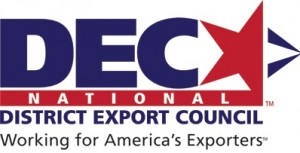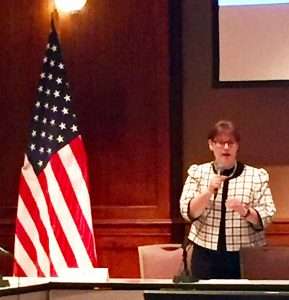CalChamber Joins Trade-Focused Summit in Washington, DC

The California Chamber of Commerce joined 40 trade specialists from across the nation last week at sessions focused on trade policy when the National District Export Council met at the U.S. Chamber of Commerce for its annual Spring Legislative Summit.
Spring Summit
The summit was opened by Derek Gianino, director of international policy at the U.S. Chamber of Commerce, who gave a welcome and legislative outlook. Robert Brown, chair of the National District Export Council (DEC), added his welcome, before the group heard perspectives from the Trump Administration given by Judy Reinke, acting assistant secretary for Global Markets and deputy director general of the U.S. and Foreign Commercial Service, U.S. Department of Commerce. Reinke previously spoke to the CalChamber in Sacramento in May 2016.
New Principles, Priorities

The Assistant Secretary outlined the new principles under which the U.S. Department of Commerce is operating with the new Administration and confirmed Secretary Wilbur Ross. The top five principles include: expanding trade; promoting reciprocity to strengthen manufacturing and expanding the export of agricultural products and services; working within bilateral agreements rather than multilateral agreements; challenging unfair trade practices; and updating current trade practices.
Within the U.S. Department of Commerce there are six internal task forces which indicate priorities for the new Administration: trade with Japan; redefining the North American Free Trade Agreement (NAFTA); addressing Brexit, Britain’s referendum on EU membership; providing manufacturers with goals to compete; a China task force; and a comprehensive task force on nontariff barriers.
This also is an information gathering time for the U.S. Department of Commerce regarding the concept of trade deficits and how to reform the executive branch of government.
Other Presenters
In the panel entitled “Trade Policy Developments and Outlook,” the audience heard from John Murphy, senior vice president of international policy at the U.S. Chamber of Commerce; David Thomas, vice president, Business Roundtable; and Ken Monahan, director for international trade policy, National Association of Manufacturers.
Murphy gave a brief overview of the importance to the trade community of contacting individual members of Congress to advocate for trade. In addition, he addressed China, which in recent years has developed a series of industrial policies that are putting American exporters at a disadvantage. Further, he addressed the Export Import Bank, which slowly is moving toward having a fully operational board.
Thomas expressed disappointment on behalf of his organization of the lack of action toward the Trans-Pacific Trade Agreement, but indicated that it is positive that Trade Promotion Authority is in place for any future agreements.

Monahan expressed the same disappointment, and then outlined a possible calendar scenario for the re-negotiation of NAFTA. In the calendar scenario, the President must send a letter to Congress and wait 90 days, and then several rounds of negotiations may take months—possibly into next year. It is important to remember that Mexico has presidential elections in July 2018 and the U.S. will have mid-term elections in November 2018. NAFTA may well be a topic of both election cycles.
Examples of “Best Practices in Communications and Fundraising for the District Export Councils” were presented by Sandra Renner, National DEC Steering Committee member; Jonathan Szues, North Carolina DEC vice-chair; and, William Cummins, National DEC Steering Committee member. The panel concluded with Sean Randolph of the Bay Area Council presenting a recently concluded report on the value of free trade agreements.
Perspectives from Capitol Hill were given by Congressman James Comer (R-KY-1), House Committee on Small Business, and co-sponsor of a Cuba trade liberalization bill; James Burchfield, professional staff, House Committee on Small Business; and Meredith West, deputy staff director, Senate Committee on Small Business and Entrepreneurship. Closing remarks were given by Robert Brown, chair, National DEC, before the group headed for individual meetings on Capitol Hill.
District Export Council
The National District Export Council is made up of 60 regional district export councils. The mission of these councils is to work with the U.S. Commerce Department on export promotion and commercial diplomacy. The 1,500 council members around the country all are appointed by the Secretary of the U.S. Department of Commerce.
Susanne T. Stirling, vice president of international affairs for the CalChamber, serves on the Northern California DEC and on the steering committee of the National DEC.